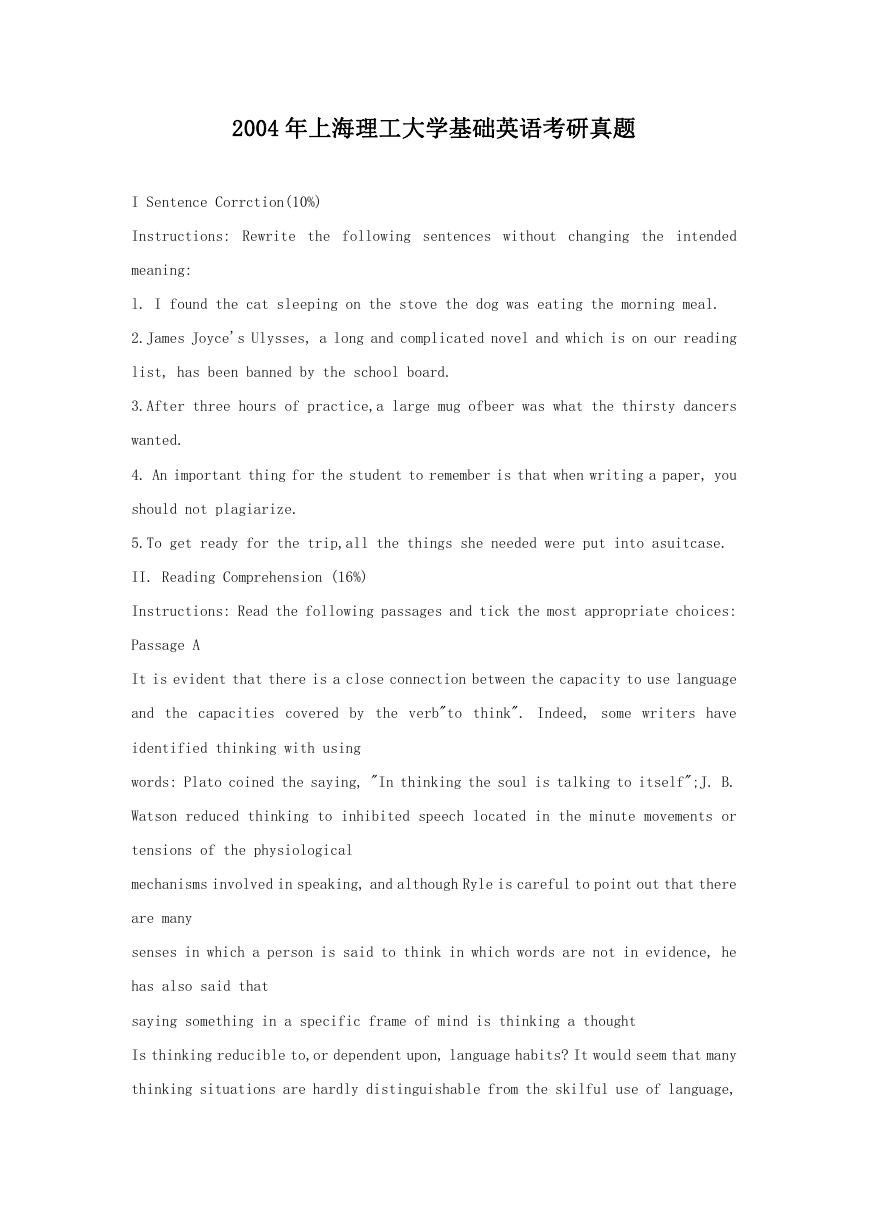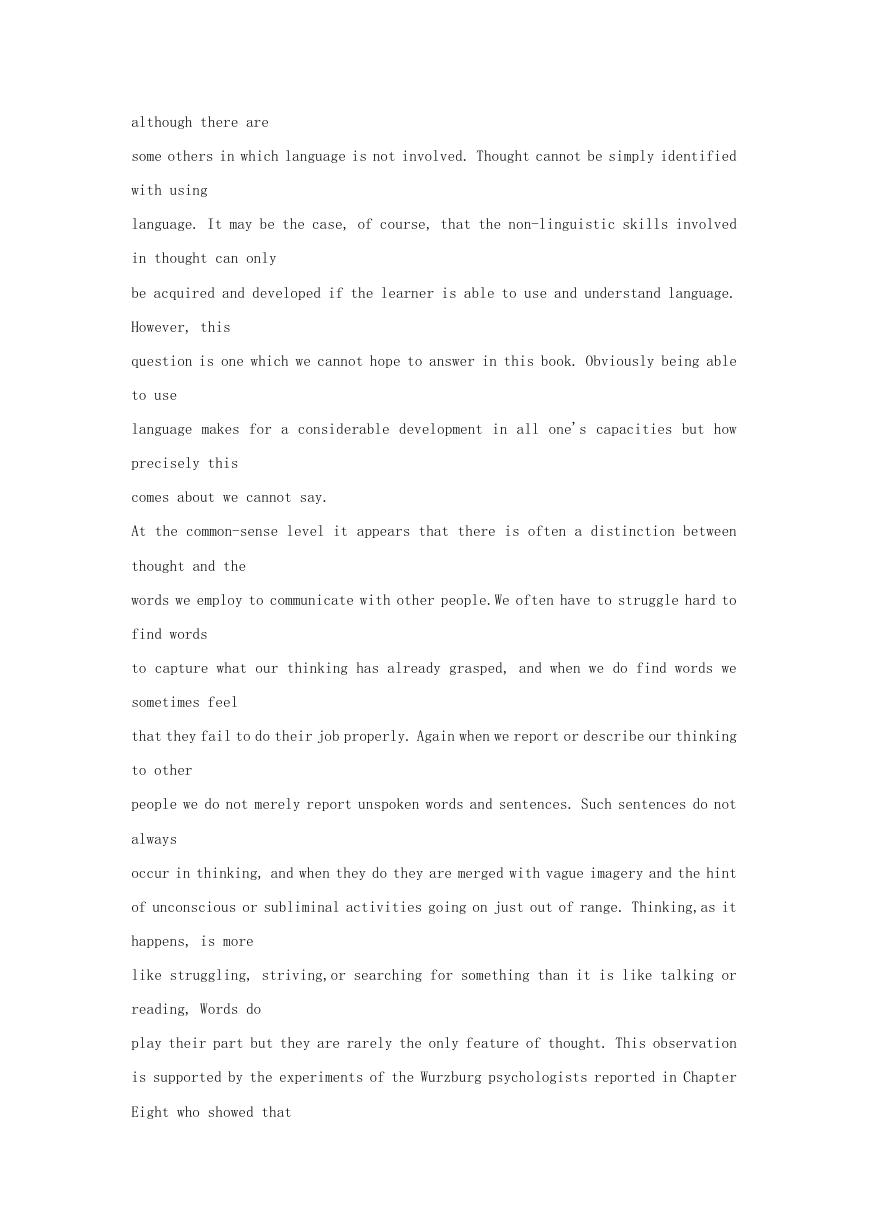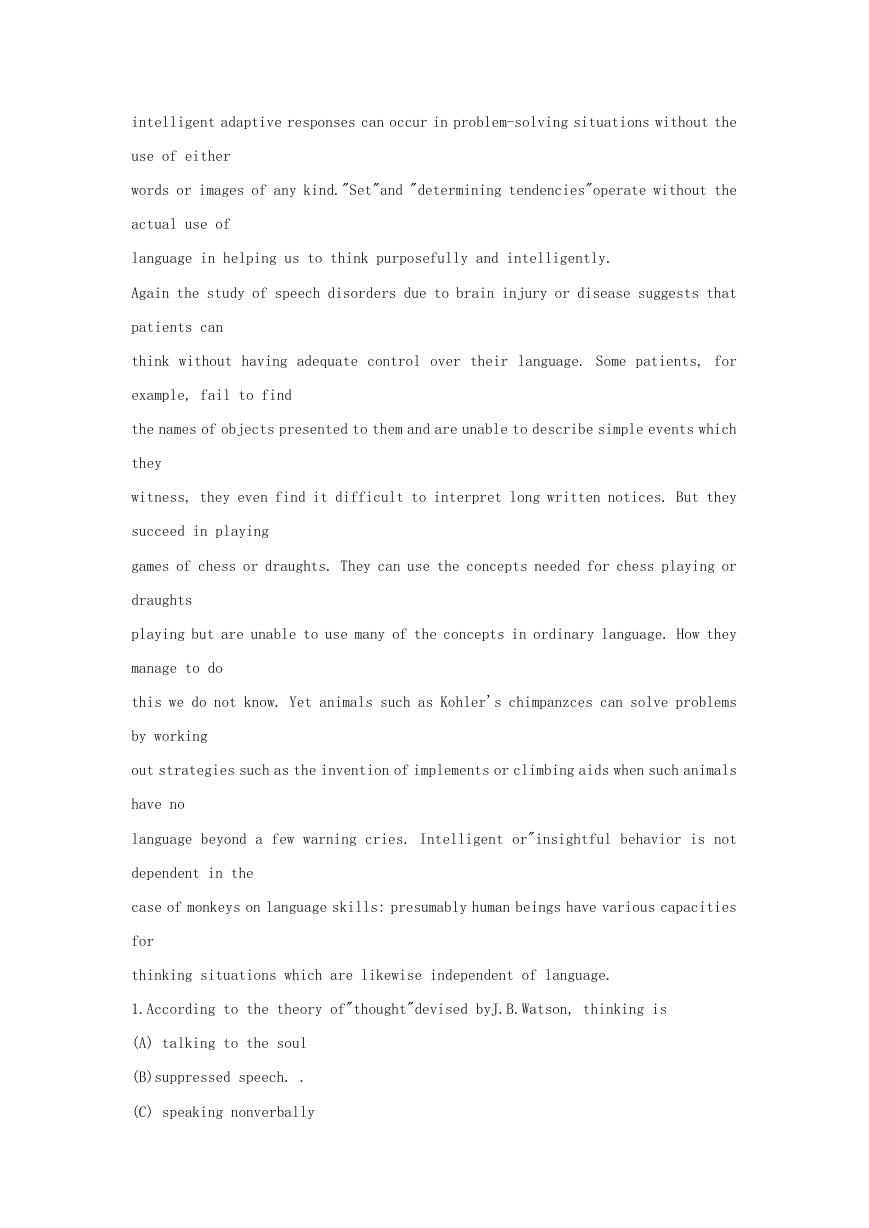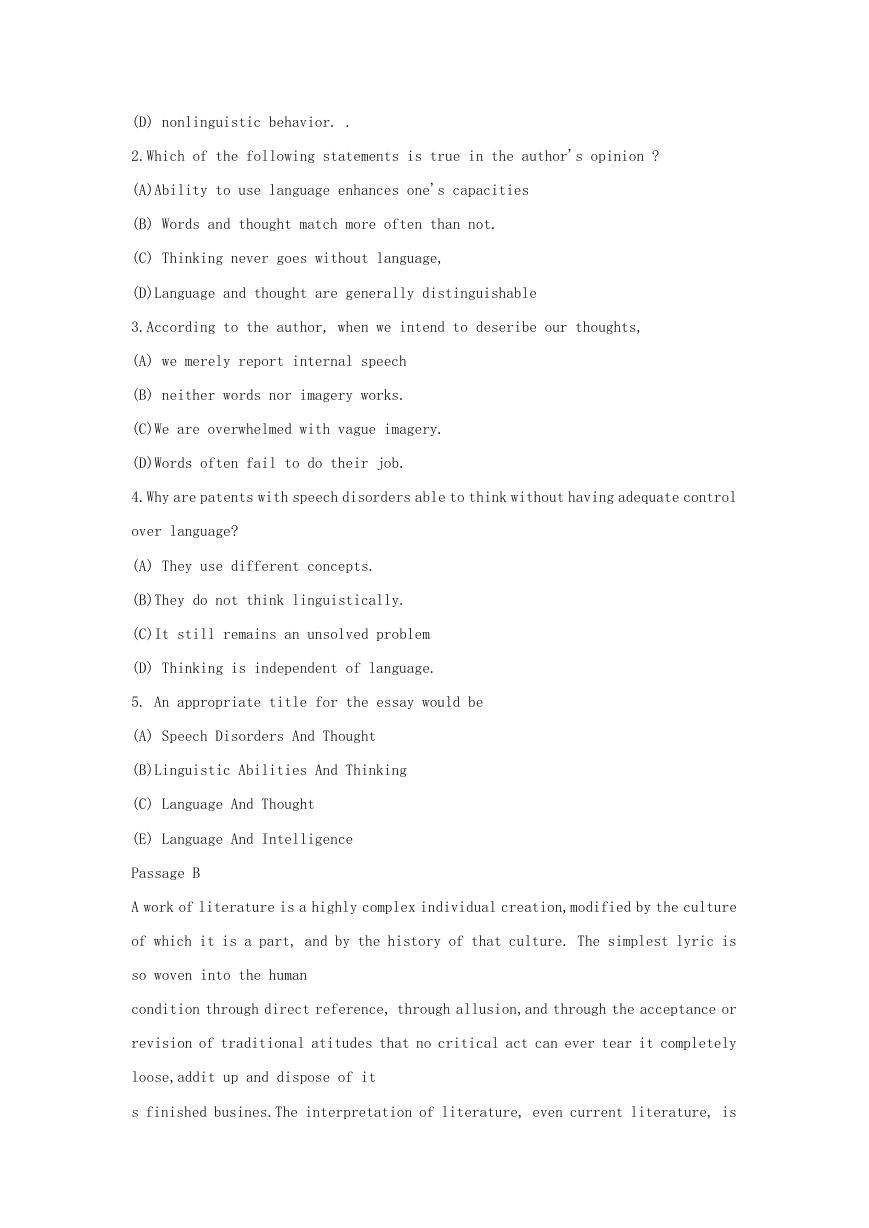2004 年上海理工大学基础英语考研真题
I Sentence Corrction(10%)
Instructions: Rewrite the following sentences without changing the intended
meaning:
l. I found the cat sleeping on the stove the dog was eating the morning meal.
2.James Joyce's Ulysses, a long and complicated novel and which is on our reading
list, has been banned by the school board.
3.After three hours of practice,a large mug ofbeer was what the thirsty dancers
wanted.
4. An important thing for the student to remember is that when writing a paper, you
should not plagiarize.
5.To get ready for the trip,all the things she needed were put into asuitcase.
II. Reading Comprehension (16%)
Instructions: Read the following passages and tick the most appropriate choices:
Passage A
It is evident that there is a close connection between the capacity to use language
and the capacities covered by the verb"to think". Indeed, some writers have
identified thinking with using
words: Plato coined the saying, "In thinking the soul is talking to itself";J. B.
Watson reduced thinking to inhibited speech located in the minute movements or
tensions of the physiological
mechanisms involved in speaking, and although Ryle is careful to point out that there
are many
senses in which a person is said to think in which words are not in evidence, he
has also said that
saying something in a specific frame of mind is thinking a thought
Is thinking reducible to,or dependent upon, language habits? It would seem that many
thinking situations are hardly distinguishable from the skilful use of language,
�
although there are
some others in which language is not involved. Thought cannot be simply identified
with using
language. It may be the case, of course, that the non-linguistic skills involved
in thought can only
be acquired and developed if the learner is able to use and understand language.
However, this
question is one which we cannot hope to answer in this book. Obviously being able
to use
language makes for a considerable development in all one's capacities but how
precisely this
comes about we cannot say.
At the common-sense level it appears that there is often a distinction between
thought and the
words we employ to communicate with other people.We often have to struggle hard to
find words
to capture what our thinking has already grasped, and when we do find words we
sometimes feel
that they fail to do their job properly. Again when we report or describe our thinking
to other
people we do not merely report unspoken words and sentences. Such sentences do not
always
occur in thinking, and when they do they are merged with vague imagery and the hint
of unconscious or subliminal activities going on just out of range. Thinking,as it
happens, is more
like struggling, striving,or searching for something than it is like talking or
reading, Words do
play their part but they are rarely the only feature of thought. This observation
is supported by the experiments of the Wurzburg psychologists reported in Chapter
Eight who showed that
�
intelligent adaptive responses can occur in problem-solving situations without the
use of either
words or images of any kind."Set"and "determining tendencies"operate without the
actual use of
language in helping us to think purposefully and intelligently.
Again the study of speech disorders due to brain injury or disease suggests that
patients can
think without having adequate control over their language. Some patients, for
example, fail to find
the names of objects presented to them and are unable to describe simple events which
they
witness, they even find it difficult to interpret long written notices. But they
succeed in playing
games of chess or draughts. They can use the concepts needed for chess playing or
draughts
playing but are unable to use many of the concepts in ordinary language. How they
manage to do
this we do not know. Yet animals such as Kohler's chimpanzces can solve problems
by working
out strategies such as the invention of implements or climbing aids when such animals
have no
language beyond a few warning cries. Intelligent or"insightful behavior is not
dependent in the
case of monkeys on language skills: presumably human beings have various capacities
for
thinking situations which are likewise independent of language.
1.According to the theory of"thought"devised byJ.B.Watson, thinking is
(A) talking to the soul
(B)suppressed speech. .
(C) speaking nonverbally
�
(D) nonlinguistic behavior. .
2.Which of the following statements is true in the author's opinion ?
(A)Ability to use language enhances one's capacities
(B) Words and thought match more often than not.
(C) Thinking never goes without language,
(D)Language and thought are generally distinguishable
3.According to the author, when we intend to deseribe our thoughts,
(A) we merely report internal speech
(B) neither words nor imagery works.
(C)We are overwhelmed with vague imagery.
(D)Words often fail to do their job.
4.Why are patents with speech disorders able to think without having adequate control
over language?
(A) They use different concepts.
(B)They do not think linguistically.
(C)It still remains an unsolved problem
(D) Thinking is independent of language.
5. An appropriate title for the essay would be
(A) Speech Disorders And Thought
(B)Linguistic Abilities And Thinking
(C) Language And Thought
(E) Language And Intelligence
Passage B
A work of literature is a highly complex individual creation,modified by the culture
of which it is a part, and by the history of that culture. The simplest lyric is
so woven into the human
condition through direct reference, through allusion,and through the acceptance or
revision of traditional atitudes that no critical act can ever tear it completely
loose,addit up and dispose of it
s finished busines.The interpretation of literature, even current literature, is
�
a dialectic process
that advances by the taking of emphatic positions, which,in turn, prepare for still
further
countering.
Nor is the process purely Hegelian, a mistaken turn may cause one to lose ground;,and
besides, what critics are trying to illuminate may once,like Hamlet, have been
clearer than it will
ever be again. This is why you are never though with literature. Something is always
being
discovered that was never known,or was only half-known, or misinterpreted,or simply
forgotten.
And yet there is always available, in varying degrees of clarity, a great body of
literature which
has proven itself to sensitive readers.
The student who gets stone inkling of this will understand why many of the questions
he
has been asking are wrong or premature. He may begin to see that with literature
as with his own
personality, he is in the presence of the mysterious,and that the clarification of
the former cannot
be separated from the clarification of the latter. In neither case is complete
clarification possible
nevertheless, one must keep driving toward the light and ifhe is fortunate enough
to move closer
to the light, it will be along converging lines that cannot meet on this earth
�










 2023年江西萍乡中考道德与法治真题及答案.doc
2023年江西萍乡中考道德与法治真题及答案.doc 2012年重庆南川中考生物真题及答案.doc
2012年重庆南川中考生物真题及答案.doc 2013年江西师范大学地理学综合及文艺理论基础考研真题.doc
2013年江西师范大学地理学综合及文艺理论基础考研真题.doc 2020年四川甘孜小升初语文真题及答案I卷.doc
2020年四川甘孜小升初语文真题及答案I卷.doc 2020年注册岩土工程师专业基础考试真题及答案.doc
2020年注册岩土工程师专业基础考试真题及答案.doc 2023-2024学年福建省厦门市九年级上学期数学月考试题及答案.doc
2023-2024学年福建省厦门市九年级上学期数学月考试题及答案.doc 2021-2022学年辽宁省沈阳市大东区九年级上学期语文期末试题及答案.doc
2021-2022学年辽宁省沈阳市大东区九年级上学期语文期末试题及答案.doc 2022-2023学年北京东城区初三第一学期物理期末试卷及答案.doc
2022-2023学年北京东城区初三第一学期物理期末试卷及答案.doc 2018上半年江西教师资格初中地理学科知识与教学能力真题及答案.doc
2018上半年江西教师资格初中地理学科知识与教学能力真题及答案.doc 2012年河北国家公务员申论考试真题及答案-省级.doc
2012年河北国家公务员申论考试真题及答案-省级.doc 2020-2021学年江苏省扬州市江都区邵樊片九年级上学期数学第一次质量检测试题及答案.doc
2020-2021学年江苏省扬州市江都区邵樊片九年级上学期数学第一次质量检测试题及答案.doc 2022下半年黑龙江教师资格证中学综合素质真题及答案.doc
2022下半年黑龙江教师资格证中学综合素质真题及答案.doc